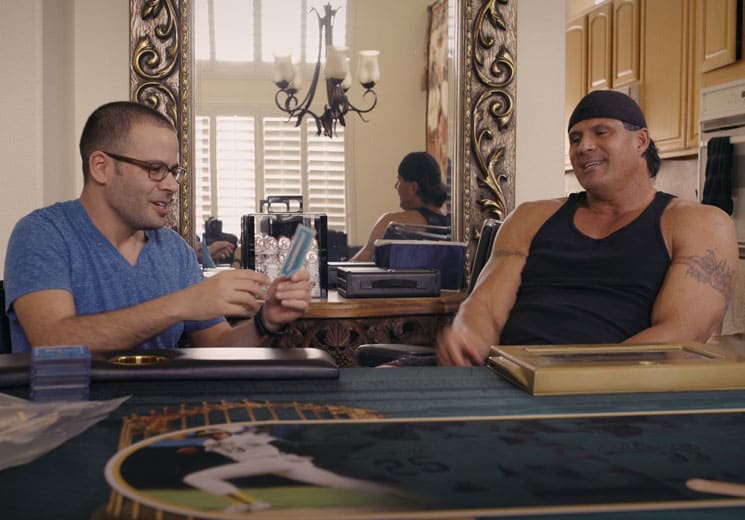Stuart Stone and Harvey Glazer's documentary Jack of All Trades balances being an exposé of the baseball-card bubble of the '80s and '90s with an exploration of Stone's daddy issues. It doesn't totally manage to weave the two threads together into a coherent narrative.
Stuart Stone's father Jack was a noteworthy figure in selling and trading baseball cards, and a driving factor in Stone's desire to revisit his collection. As Stone sets out to learn about the baseball card industry, he returns to locations like the card shop "Sluggers," which his father owned before abandoning the family when Stone was barely a teen. As the documentary progresses, Stone faces mounting pressure from Glazer and his production team to include details about how his absent father fits into the story, professionally and personally.
There is a contrived feeling to parts of the documentary, particularly in the first half as they set up the premise and stakes. When Stone goes to a baseball card show, he "discovers" that baseball cards are no longer worth anything. On his way to the card show, his box of baseball cards, left on the street, is driven over by his sister Karie, and they start arguing in the parking lot. Microphones dip in and out of the frame, and there is a distinct reality show quality that emerges. In the midst of the fight, the documentary cuts to his producer and brother-in-law, Adam Rodness, dramatically sitting in a classic folding director's chair against an all-grey background, to offer his commentary.
When the doc isn't cutting between the dramatic commentary and internal production arguments, there are brief scenes that are more in line with what's expected of a baseball-card documentary. Interviews with MLB outfielder Jose Canseco and "Foul Ball" Paul, who holds a Guinness World Record for owning more than 1.5 million baseball cards, are charming glimpses of individuals deeply impacted by the baseball-card industry.
The grand reveal about baseball cards is the scarcity principle. The cards that were supposed to be rare started being printed in excess, demand lessened, and they lost their value. There's only so much time that this takes up in the documentary. "The rest of it's boring, I'd rather talk about like, your dad fucking his employees," says co-director Harvey Glazer during one of the several parking lot arguments. While the shift of focus to Stone's daddy drama is not exactly seamless, the documentary does start coming together as he begins learning more about his father, and confronting the feelings of pain and abandonment caused by his leaving.
At its most generous, Jack of All Trades could be said to offer a meta-commentary on the difficulties of collaborating and crafting personal narrative. While it doesn't reveal groundbreaking discoveries about the baseball card industry, it is still likely to satisfy an audience's craving for nostalgia, while providing a couple of earnest, vulnerable moments along the way.
(Breakthrough Entertainment)Stuart Stone's father Jack was a noteworthy figure in selling and trading baseball cards, and a driving factor in Stone's desire to revisit his collection. As Stone sets out to learn about the baseball card industry, he returns to locations like the card shop "Sluggers," which his father owned before abandoning the family when Stone was barely a teen. As the documentary progresses, Stone faces mounting pressure from Glazer and his production team to include details about how his absent father fits into the story, professionally and personally.
There is a contrived feeling to parts of the documentary, particularly in the first half as they set up the premise and stakes. When Stone goes to a baseball card show, he "discovers" that baseball cards are no longer worth anything. On his way to the card show, his box of baseball cards, left on the street, is driven over by his sister Karie, and they start arguing in the parking lot. Microphones dip in and out of the frame, and there is a distinct reality show quality that emerges. In the midst of the fight, the documentary cuts to his producer and brother-in-law, Adam Rodness, dramatically sitting in a classic folding director's chair against an all-grey background, to offer his commentary.
When the doc isn't cutting between the dramatic commentary and internal production arguments, there are brief scenes that are more in line with what's expected of a baseball-card documentary. Interviews with MLB outfielder Jose Canseco and "Foul Ball" Paul, who holds a Guinness World Record for owning more than 1.5 million baseball cards, are charming glimpses of individuals deeply impacted by the baseball-card industry.
The grand reveal about baseball cards is the scarcity principle. The cards that were supposed to be rare started being printed in excess, demand lessened, and they lost their value. There's only so much time that this takes up in the documentary. "The rest of it's boring, I'd rather talk about like, your dad fucking his employees," says co-director Harvey Glazer during one of the several parking lot arguments. While the shift of focus to Stone's daddy drama is not exactly seamless, the documentary does start coming together as he begins learning more about his father, and confronting the feelings of pain and abandonment caused by his leaving.
At its most generous, Jack of All Trades could be said to offer a meta-commentary on the difficulties of collaborating and crafting personal narrative. While it doesn't reveal groundbreaking discoveries about the baseball card industry, it is still likely to satisfy an audience's craving for nostalgia, while providing a couple of earnest, vulnerable moments along the way.
